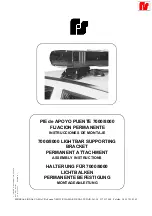
Resetting the system
Reset the system after each correction of the
tire inflation pressure and after every tire or
wheel change.
1.
"Vehicle Info"
2.
"Vehicle status"
3.
"Reset"
4.
Start the engine - do not drive away.
5.
Reset the tire pressure using "Reset".
6.
Drive away.
The tires are shown in gray and "Resetting
TPM..." is displayed.
After driving for a few minutes, the set tire in‐
flation pressures are applied as set values. The
resetting process is completed automatically
as you drive. The tires are shown in green and
"TPM active" is shown on the Control Display.
The trip can be interrupted at any time. If you
drive away again, the process resumes auto‐
matically.
If a flat tire is detected while the system is re‐
setting, all tires on the Control Display are dis‐
played in yellow. The message "Low tire!" is
shown.
Low tire pressure message
The small warning lamp lights up yel‐
low and the large warning lamp lights
up red. A message appears on the
Control Display. In addition, a signal
sounds.
▷
There is a flat tire or a major loss in tire in‐
flation pressure.
▷
The system was not reset after a wheel
change and thus issues warnings based on
the inflation pressures initialized last.
Reduce your speed and stop cautiously. Avoid
sudden braking and steering maneuvers.
Do not continue driving without run-flat
tires
Do not continue driving if the vehicle is not
equipped with run-flat tires; continued driving
may result in serious accidents.◀
When a low inflation pressure is indicated,
DSC Dynamic Stability Control is switched on
if necessary.
Actions in the event of a flat tire
Run-flat tires
Maximum speed
You can continue driving with a damaged tire
at speeds up to 50 mph/80 km/h.
Continued driving with a flat tire
If continuing to drive with a damaged tire:
1.
Avoid sudden braking and steering maneu‐
vers.
2.
Do not exceed a speed of 50 mph/80 km/h.
3.
Check the air pressure in all four tires at
the next opportunity.
If the tire inflation pressure in all four tires
is correct, the Tire Pressure Monitor may
not have been reset. Reset the system.
Possible driving distance with complete loss of
tire inflation pressure:
The possible driving distance after a loss of tire
inflation pressure depends on the cargo load
and the driving style and conditions.
For a vehicle containing an average load, the
possible driving distance is ap‐
prox. 50 miles/80 km.
When the vehicle is driven with a damaged tire,
its handling characteristics change, e.g., re‐
duced lane stability during braking, a longer
braking distance, and altered self-steering
properties. Adjust your driving style accord‐
ingly. Avoid abrupt steering maneuvers or driv‐
ing over obstacles, e. g., curbs, potholes, etc.
Seite 94
Controls
Safety
94
Online Edition for Part no. 01 40 2 911 269 - VI/13
Summary of Contents for 2013 X1
Page 2: ......
Page 10: ...Online Edition for Part no 01 40 2 911 269 VI 13 ...
Page 28: ...Online Edition for Part no 01 40 2 911 269 VI 13 ...
Page 127: ...Storage compartments Controls 127 Online Edition for Part no 01 40 2 911 269 VI 13 ...
Page 128: ...Online Edition for Part no 01 40 2 911 269 VI 13 ...
Page 140: ...Online Edition for Part no 01 40 2 911 269 VI 13 ...
Page 162: ...Online Edition for Part no 01 40 2 911 269 VI 13 ...
Page 193: ...CD multimedia Entertainment 193 Online Edition for Part no 01 40 2 911 269 VI 13 ...
Page 194: ...Online Edition for Part no 01 40 2 911 269 VI 13 ...
Page 226: ...Online Edition for Part no 01 40 2 911 269 VI 13 ...
Page 231: ...Fuel Mobility 231 Online Edition for Part no 01 40 2 911 269 VI 13 ...
Page 267: ...Care Mobility 267 Online Edition for Part no 01 40 2 911 269 VI 13 ...
Page 268: ...Online Edition for Part no 01 40 2 911 269 VI 13 ...
Page 294: ......
















































